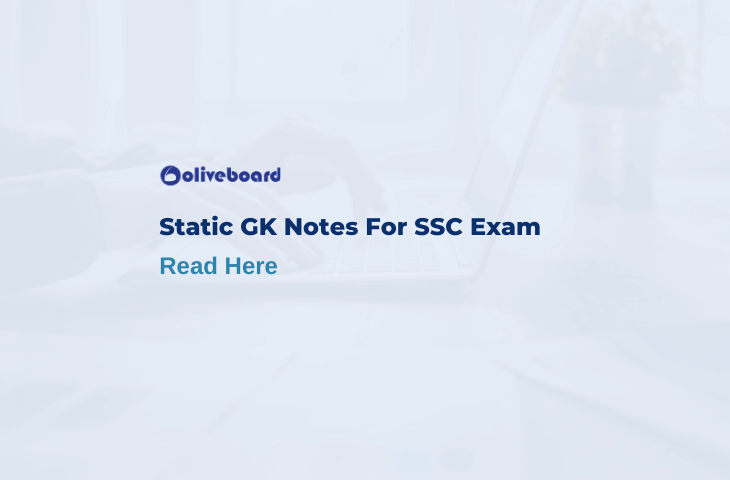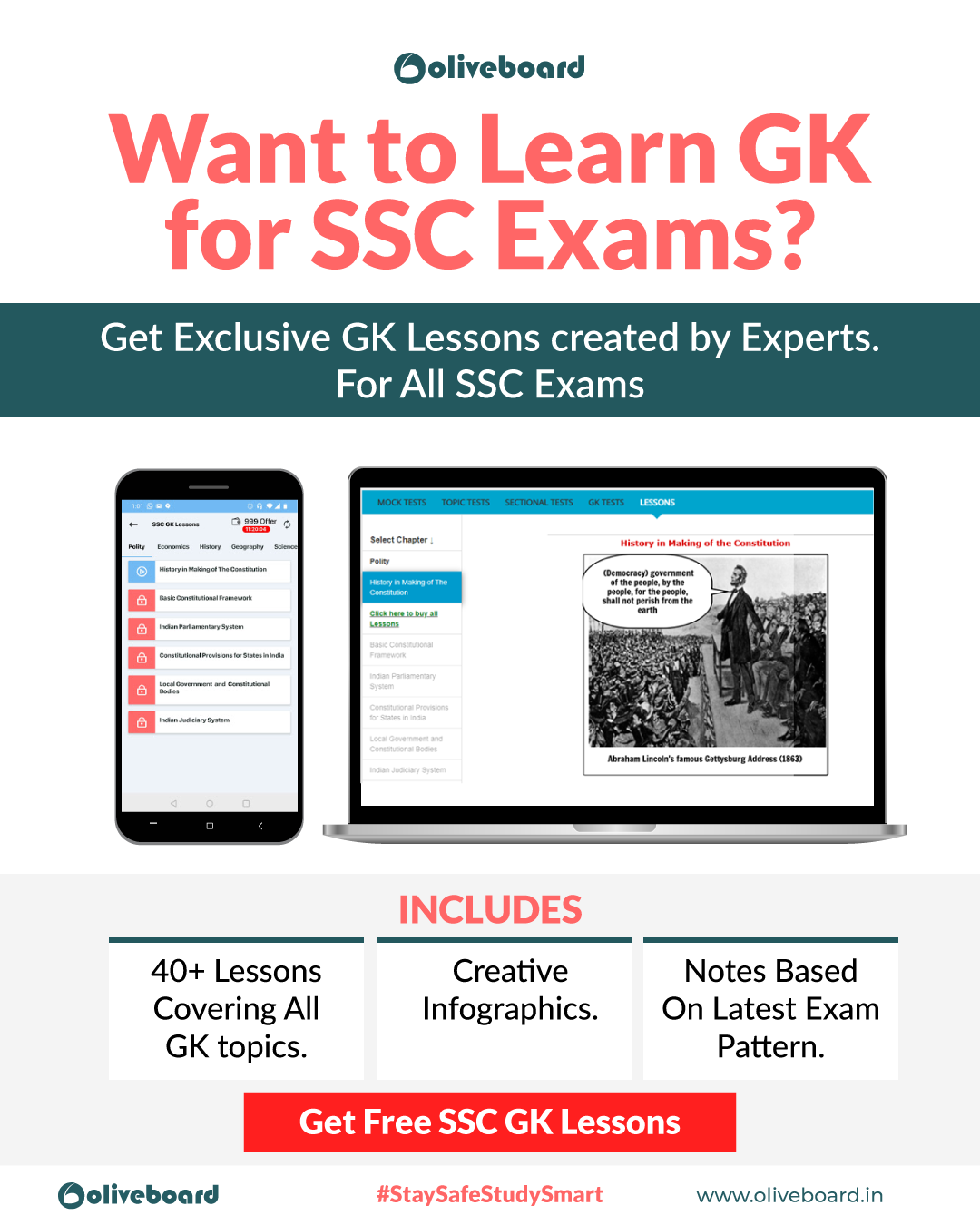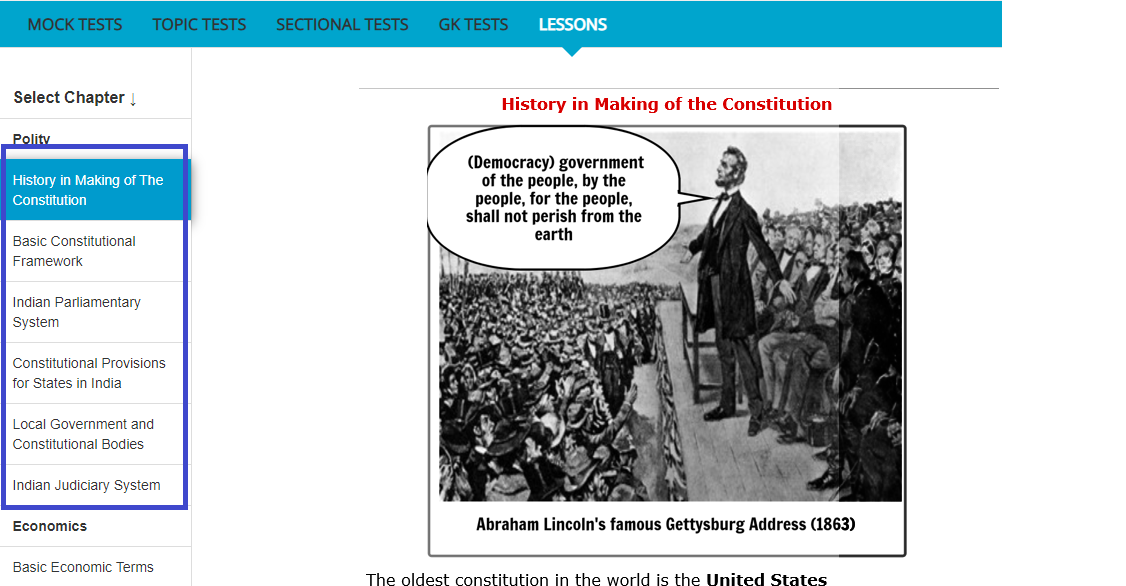Static GK section is considered to be one of the highest-scoring section of SSC CGL Exam conducted every year. It aims to test the candidate’s static gk knowledge occurring all around the world and in India. With only good practice and preparation, you can attempt maximum questions in less time and can score well in the General Awareness section.
Good practice and preparation require a good and detailed amount of static GK notes. To help you with the notes we have come up with SSC GK Lessons on our App and Website. A total of 46 lessons covering all GK topics have been added.
The chapters covered under “Static GK Lessons” are as follows:
- Polity
- Economics
- History
- Geography
- Science
To know more about SSC GK Lessons read the whole blog. Want to know the types of questions asked in SSC Exams? Register Here.
Static GK Classes Online
As we are aware that Static General Knowledge is very important for different government exams and a good knowledge of general awareness is very important for every government exam.
To help you with the complete Static GK we are starting up with a New series of classes for Static GK. Classes will be taken by Saurabh sir on Oliveboard Main Channel between 4 PM to 4:30 PM every Tuesday and Thursday. Attempt the daily Static GK Classes here daily by clicking on the link given below:
Static GK For SSC Exam – Detailed Lessons & Notes
Before moving on to the SSC Static GK Lessons and Notes let’s have a look at the major topics that come in SSC CGL examination under General Awareness section.
| Subject | Sub-Topics | No. of Questions Asked |
|---|---|---|
| Polity | History in the making of the constitution. | 9-11 Questions |
| Basic constitutional framework. | ||
| Indian Parliamentary System. | ||
| Constitutional Provisions For States In India. | ||
| Local Government & Constitutional Bodies. | ||
| Indian Judiciary System | ||
| Economics | Basic Economic Times | |
| Microeconomics | ||
| Macroeconomics | ||
| Money and Banking | ||
| People and Poverty | ||
| Tax and Budget | ||
| Economic Reforms | ||
| History | From Old stone age to civilization | |
| The Magadha Empire | ||
| Southern Kingdoms | ||
| India in Medieval Times | ||
| The Mughal Era | ||
| Sufi and Bhakti Movements | ||
| Europeans on Indian Social | ||
| Social, Education, and Administrative Reforms | ||
| Movements that were Regional in Nature | ||
| Indian National Movements | ||
| Gandhian Philosophy in Achieving Independence | ||
| After War Politics | ||
| Geography | Geography as a discipline | |
| Landforms on the surface of the earth | ||
| Indian Geography | ||
| Science | Particles of matter | 8-10 Questions |
| Atoms and Molecules | ||
| Carbon and its compounds | ||
| Chemical Equations | ||
| Metals and Non-Metals | ||
| Period Classification of elements | ||
| Cell: Fundamental unit of life | ||
| Diversity In Living Organism | ||
| Control and co-ordination | ||
| Life Processes | ||
| Reproduction System | ||
| Environment | ||
| Mechanics | ||
| Gravitation and Work, Power, Energy | ||
| Light: Reflection and Refraction | ||
| Electricity | ||
| Magnetic Effects of Electric Current | ||
| Sound |
What We Have Different From Others?
- Total of 46 lessons covering all GK topics.
- These have a few creative images that make the lessons more fun to read.
- A detailed description of all the topics.
- Notes are based on the latest exam pattern.
1. Polity Brief Notes
History In Making of the Indian Constitution
The oldest constitution in the world is the United States Constitution. The Philadelphia Convention is credited with writing the US constitution, and James Madison is known as the Father of the Constitution.
Evolution of Indian Political System: Some of the important acts in India before Independence (August 15th) 1947 are The Regulating Act, 1773, Pits India Act, 1784, The Charter Acts, The Government of India Acts and The Indian Council Acts.
The Regulating Act, 1773
- The Regulating Act 1773 was first attempted by the British Parliament to regulate the affairs of the Company in India. This was the first attempt towards Centralised Administration.
- In this Act Governor of Bengal became Governor-General for all British Territories in India.
- Bombay and Madras Presidency subordinated to Bengal Presidency in certain matters. Supreme Court to be set-up at Calcutta.
For detailed Static SSC GK Lessons and study notes click Get SSC GK Lessons Here..
2. Economics Brief Notes
Basic Economics Systems
What is Economics?
Economics is about the study of scarcity and choice by finding ways of reconciling unlimited wants with limited resources.
The economics of the individual agent’s decisions about resources is referred to as microeconomics, while macroeconomics studies the interactions in the economy as a whole. Our focus here is on microeconomic theory.
What is Welfare Economics?
Welfare economics is the study of how the structure markets and allocation of economic goods and resources determine the overall well being of society.
Basic Terminologies
- Demand is the quantity of a good the buyers are willing to purchase at a particular price.
- Supply is the number of goods the sellers are willing to deliver at a particular price. Meanwhile is a result of a constant tug of war between the demand and supply.
Get Detailed Economics Notes Here.
3. History Brief Notes
Ancient India
In India, the prehistoric period is divided into Paleolithic (Old Stone Age), Mesolithic (Middle Stone Age), Neolithic (New Stone Age), and Metal Age.
Paleolithic (Old Stone Age):
The period before 10,000 B.C is assigned to the Old Stone Age. In the Old Stone Age, food was obtained by hunting animals and gathering edibles plants and tubers.
Therefore these people are called hunter-gatherers. They used stone tools, hand-sized, and flaked off large pebbles for hunting animals. Stone implements are made of a hard rock known as quartzite.
Some of the famous sites of Old Stone Age in India are:
- The Soan Valley and Potwar Plateau in northwest India.
- The Siwalik hills of North India.
- Bhimbetka in Madhya Pradesh.
- Adamgarh Hill in Narmada Valley.
- Kurnool in Andhra Pradesh.
- Attirampakkam near Chennnai.

Want Study Notes For Above Mentioned Topics? Click Here & Register Yourself.
4. Geography Brief Notes
What is Geography?
Geography is the description o the earth. The term geography was first coined by Eratosthenese, a greek Skholar (276-194 B.C.). The world has been deprived of two roots from greek Language geo (earth) and graphs (description).
Branches of Geography (Based on Systematic Approach)
1. Physical Geography
- Geomorphology
- Climatology
- Hydrology
- Soil Geography
2. Human Geography
- Social/ Cultural Geography
- Population and Settlement Geography
- Economic Geography
- Historical Geography
Want to study more about Landforms on the Surface of the Earth and Indian Geography? Click Here For Detailed Study Notes.
5. Science Brief Study Notes
What is Matter?
The matter is made up of particles that are very small. A matter occupies space and has mass. It can exist in one of the three mains states of Solids, Liquids, and Gases.
Characteristics of Particles of Matter
Particles of matter have space between them – There is enough space between particles. The particles of one type of matter get into spaces between the particles of other types of matter.
Particles of Matter are continuously moving – The particles are moving continuously and have Kinetic Energy. As the temperature rises, the particles move faster than normal.
The mixing of particles of two different types of matter on their own is called Diffusion.
Particles of matter attract each other – The particles of matter have acting force between them. The force binds the particle tightly. The strength of the force of attraction varies depending on the behavior of particles.
For Detailed SSC Science Notes. Register Now!

This was all from us in this blog, Static GK SSC Lessons. Now you can get the notes on Static SSC GK Lessons for the SSC exam preparation along with Mock Tests.
Also Check:
Hi, I’m Tripti, a senior content writer at Oliveboard, where I manage blog content along with community engagement across platforms like Telegram and WhatsApp. With 3 years of experience in content and SEO optimization, I have led content for popular exams like SSC, Banking, Railways, and State Exams.





